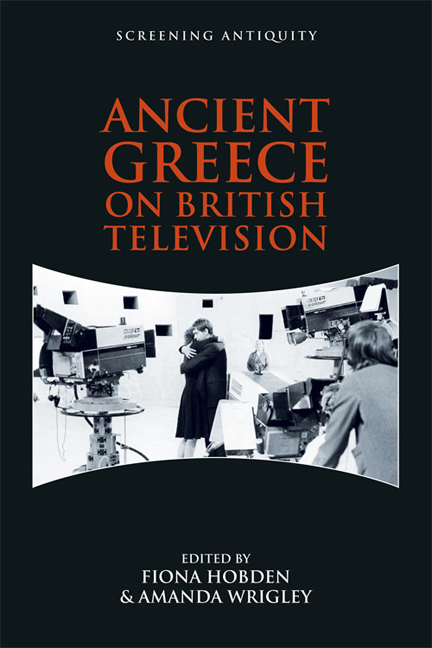Book contents
- Frontmatter
- Contents
- List of Figures and Tables
- Series Editors’ Preface
- Acknowledgements
- Contributors
- Abbreviations
- Broadcasting Greece: An Introduction to Greek Antiquity on the Small Screen
- 1 Are We the Greeks? Understanding Antiquity and Ourselves in Television Documentaries
- 2 Louis MacNeice and ‘The Paragons of Hellas’: Ancient Greece as Radio Propaganda
- 3 The Beginnings of Civilisation: Television Travels to Greece with Mortimer Wheeler and Compton Mackenzie
- 4 Tragedy for Teens: Ancient Greek Tragedy on BBC and ITV Schools Television in the 1960s
- 5 The Serpent Son (1979): A Science Fiction Aesthetic?
- 6 Don Taylor, the ‘Old-Fashioned Populist’? The Theban Plays (1986) and Iphigenia at Aulis (1990): Production Choices and Audience Responses
- 7 The Odyssey in the ‘Broom Cupboard’: Ulysses 31 and Odysseus: The Greatest Hero of Them All on Children’s BBC, 1985–1986
- 8 Greek Myth in the Whoniverse
- 9 The Digital Aesthetic in ‘Atlantis: The Evidence’ (2010)
- 10 Greece in the Making: From Intention to Practicalities in Television Documentaries. A Conversation with Michael Scott and David Wilson
- Bibliography
- Index
3 - The Beginnings of Civilisation: Television Travels to Greece with Mortimer Wheeler and Compton Mackenzie
Published online by Cambridge University Press: 24 April 2021
- Frontmatter
- Contents
- List of Figures and Tables
- Series Editors’ Preface
- Acknowledgements
- Contributors
- Abbreviations
- Broadcasting Greece: An Introduction to Greek Antiquity on the Small Screen
- 1 Are We the Greeks? Understanding Antiquity and Ourselves in Television Documentaries
- 2 Louis MacNeice and ‘The Paragons of Hellas’: Ancient Greece as Radio Propaganda
- 3 The Beginnings of Civilisation: Television Travels to Greece with Mortimer Wheeler and Compton Mackenzie
- 4 Tragedy for Teens: Ancient Greek Tragedy on BBC and ITV Schools Television in the 1960s
- 5 The Serpent Son (1979): A Science Fiction Aesthetic?
- 6 Don Taylor, the ‘Old-Fashioned Populist’? The Theban Plays (1986) and Iphigenia at Aulis (1990): Production Choices and Audience Responses
- 7 The Odyssey in the ‘Broom Cupboard’: Ulysses 31 and Odysseus: The Greatest Hero of Them All on Children’s BBC, 1985–1986
- 8 Greek Myth in the Whoniverse
- 9 The Digital Aesthetic in ‘Atlantis: The Evidence’ (2010)
- 10 Greece in the Making: From Intention to Practicalities in Television Documentaries. A Conversation with Michael Scott and David Wilson
- Bibliography
- Index
Summary
At the end of the 1950s both the eminent archaeologist Sir Mortimer Wheeler (1890–1976) and author and secret service veteran Sir Compton Mackenzie (1883–1972) presented film documentary series about ancient Greece for BBC Television. Although aspects of the classical world had been considered in earlier television programmes, Wheeler's Armchair Voyage: Hellenic Cruise (BBC, 1958) and The Glory that was Greece (BBC, 1959) with Mackenzie were the small screen's earliest sustained engagements with the subject. The television critic of The Manchester Guardian described the first episode in Wheeler's series as ‘an instance of television really opening a window upon the world and genuinely giving people a foretaste of something tremendously satisfying that they can go and do for themselves’. For The Listener, K. W. Gransden welcomed Mackenzie's initial offering as ‘a most impressive and enjoyable film, both for classicists like myself and, I should guess, for those to whom it was all new’. Sequences filmed at significant classical sites in Greece feature in both series, although the documentary languages that each develops and their approaches to representing place and space are distinct. Seen almost sixty years on they also reveal contrasting concerns, as Wheeler addresses archaeological questions within a broadly humanist framework while Mackenzie develops a more explicitly political discourse with an embrace of contemporary parallels.
This chapter outlines the precursors of and influences on Wheeler's and Mackenzie's series, exploring within a broad cultural frame the legacies of early modern travellers and of the Grand Tour, the development of sightseeing and popular tourism from the eighteenth century onwards, representations of Greece in literature, painting and photography, technologies for virtual voyages, illustrated lectures and film travelogues as well as the mediation of travel by radio and early television. I argue that elements of each of these antecedents contributed to the formation of the two series, along with the public service understandings of the BBC's mission, the social and educational aspirations of a post-war, middle-class audience and the personal interests of the two presenters. Yet while both series can be seen as pioneering certain techniques that would quickly become established for presenter-led documentary series, the visual language of neither is entirely successful.
- Type
- Chapter
- Information
- Ancient Greece on British Television , pp. 64 - 83Publisher: Edinburgh University PressPrint publication year: 2018



